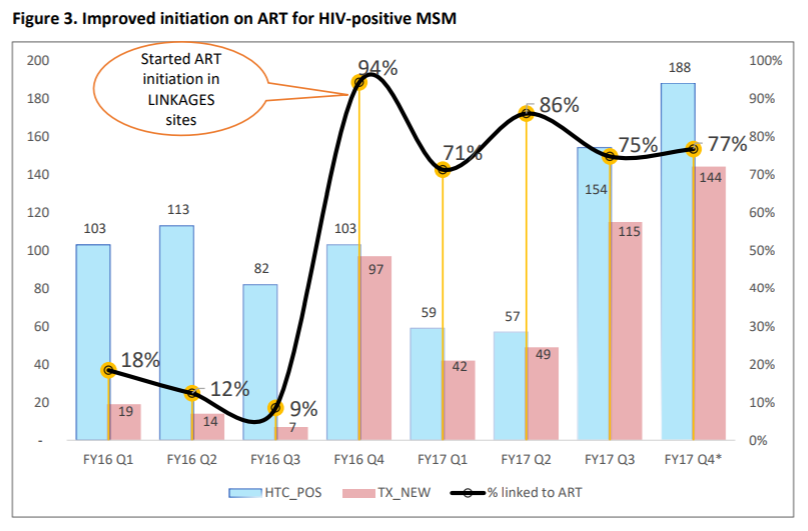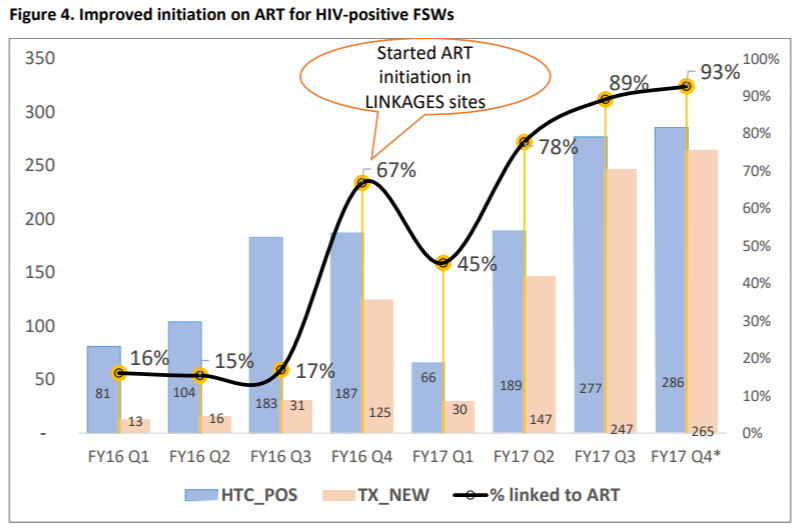Written by LINKAGES Haiti staff.
Differentiated antiretroviral therapy (ART) delivery, a part of differentiated care, aims to improve retention and viral suppression by optimizing drug and care delivery. Models fall into four categories: health care worker-managed groups, client-managed groups, facility-based individual, and out-of-facility individual. The case studies presented in this four-part series come from the USAID– and PEPFAR-supported LINKAGES project in Botswana, Haiti, Kenya, and Malawi. They are examples of the out-of-facility individual model, sometimes referred to as the community model, and can be found in Differentiated Care for Antiretroviral Therapy for Key Populations: Case Examples from the LINKAGES Project.
Through its implementing partners, LINKAGES Haiti delivers differentiated care for men who have sex with men (MSM) and female sex workers (FSWs). The goal of LINKAGES is to improve access to and uptake of HIV prevention, testing, and care and treatment services for these key populations (KPs). In Haiti, following the Ministry of Health’s adoption of the World Health Organization’s recommendation for Test and Start — an approach where people are started on ART immediately after being diagnosed with HIV — LINKAGES has scaled up access to ART among MSM and FSWs by integrating ART delivery within 10 existing KP-focused service delivery sites from October 2016 to June 2017. A multidisciplinary health care team is available at the site level (medical doctors, nurses, lab technicians, psychologist, pharmacist, and social workers). This team is trained not only in HIV counseling, care, and treatment, but also on provision of KP-friendly services to ensure that KPs are able to access services without fear of stigma and discrimination. Safe spaces were also added in the sites that did not previously have a safe space for KPs to conduct social activities and meetings.
Three of the sites are operated by Fondation SEROvie, a KP-led organization that provides HIV prevention and testing services, along with critical community engagement and empowerment activities. Before the introduction of ART services at these sites, MSM who tested positive at a SEROvie center or at a mobile testing drive were referred to other public and private ART sites. After the addition of ART services at SEROvie sites, the ART initiation rate among MSM improved from less than 18 percent to over 70 percent and even reached 94 percent in one quarter (Figure 3). The increased ART initiation rate among MSM is due to the availability of ART at SEROvie, thus removing the need for referral and links to care and treatment at other health facilities.
Six other sites are operated by FOSREF, an organization that provides services for FSWs. Before ART service was added to these sites, HIV-positive FSWs were referred to other public and private clinics for ART, and the percentage of FSWs initiated on treatment was less than 17 percent. After the addition of ART services at the FOSREF sites, the ART initiation rate has been consistently 45 percent and climbed to over 78 percent in the past three quarters (Figure 4).
 In addition to ART provision at these centers, the ten sites offer community antiretroviral distribution to HIV-positive FSWs and MSM to reinforce patient retention in treatment and care. Dr. Rachid Dorsainvil, an HIV technical advisor with FHI 360, explains, “In Haiti, two models of differentiated care are used across the LINKAGES network: community drug distribution and multi-month scripting. Both models have contributed to the improvements in links to care and treatment observed for both MSM and FSWs in Haiti last year.”
In addition to ART provision at these centers, the ten sites offer community antiretroviral distribution to HIV-positive FSWs and MSM to reinforce patient retention in treatment and care. Dr. Rachid Dorsainvil, an HIV technical advisor with FHI 360, explains, “In Haiti, two models of differentiated care are used across the LINKAGES network: community drug distribution and multi-month scripting. Both models have contributed to the improvements in links to care and treatment observed for both MSM and FSWs in Haiti last year.”
As part of these two models, at SEROvie and FOSREF peer navigators are responsible for delivering the ART, and clients can receive an antiretroviral supply for two to three months, depending on their adherence level. This strategy is used primarily by HIV-positive patients who cannot come regularly to pick up their antiretroviral treatment because of the distance or their busy schedules.
Rafael Reynold, a MSM and a beneficiary of SEROvie’s HIV-related services, works as a chef in a restaurant. He recounts the difference community distribution and multi-month scripting have made for him: “I was diagnosed HIV positive two years ago during a mobile testing activity that was conducted in my neighborhood by a SEROvie clinical team. I was initiated on ART at the SEROvie clinic located in Port-au-Prince. As I never missed an appointment and had my viral load suppressed, I have benefitted [from a] three-month antiretroviral supply. I don’t have to stress about going every month [for an] appointment, as I work seven days a week in the restaurant. So, being able to experience the community drug distribution has really improved my life.”
